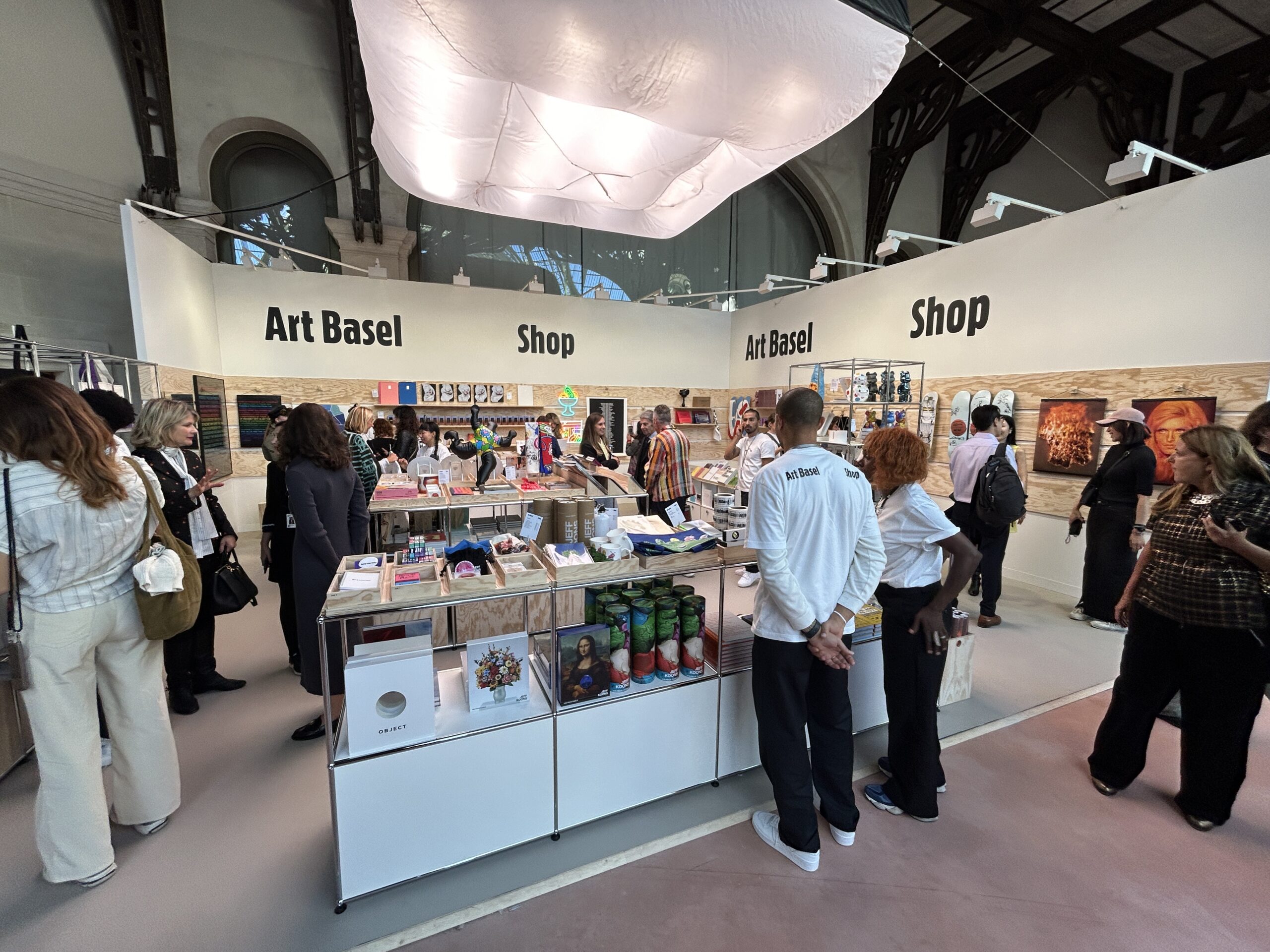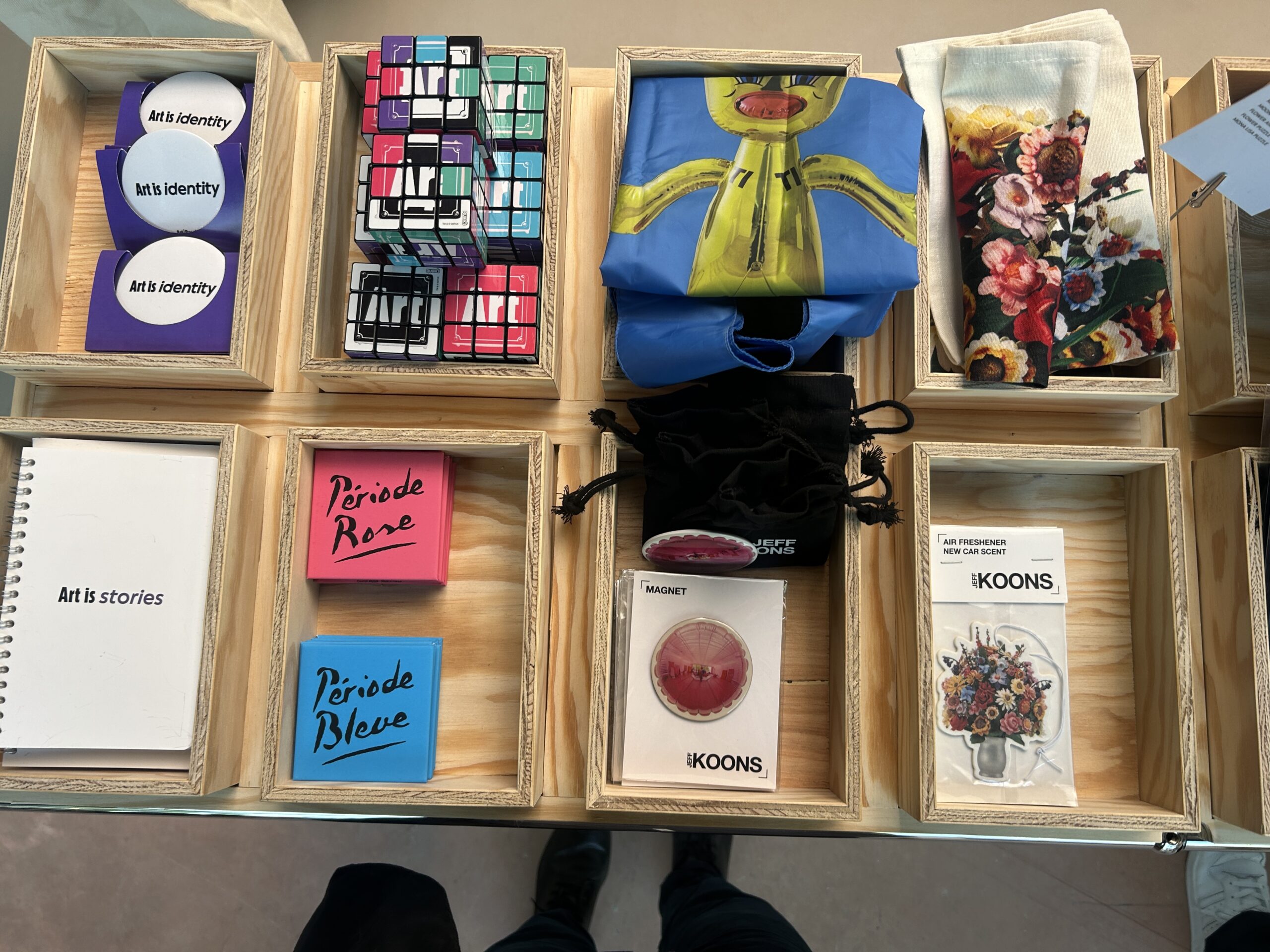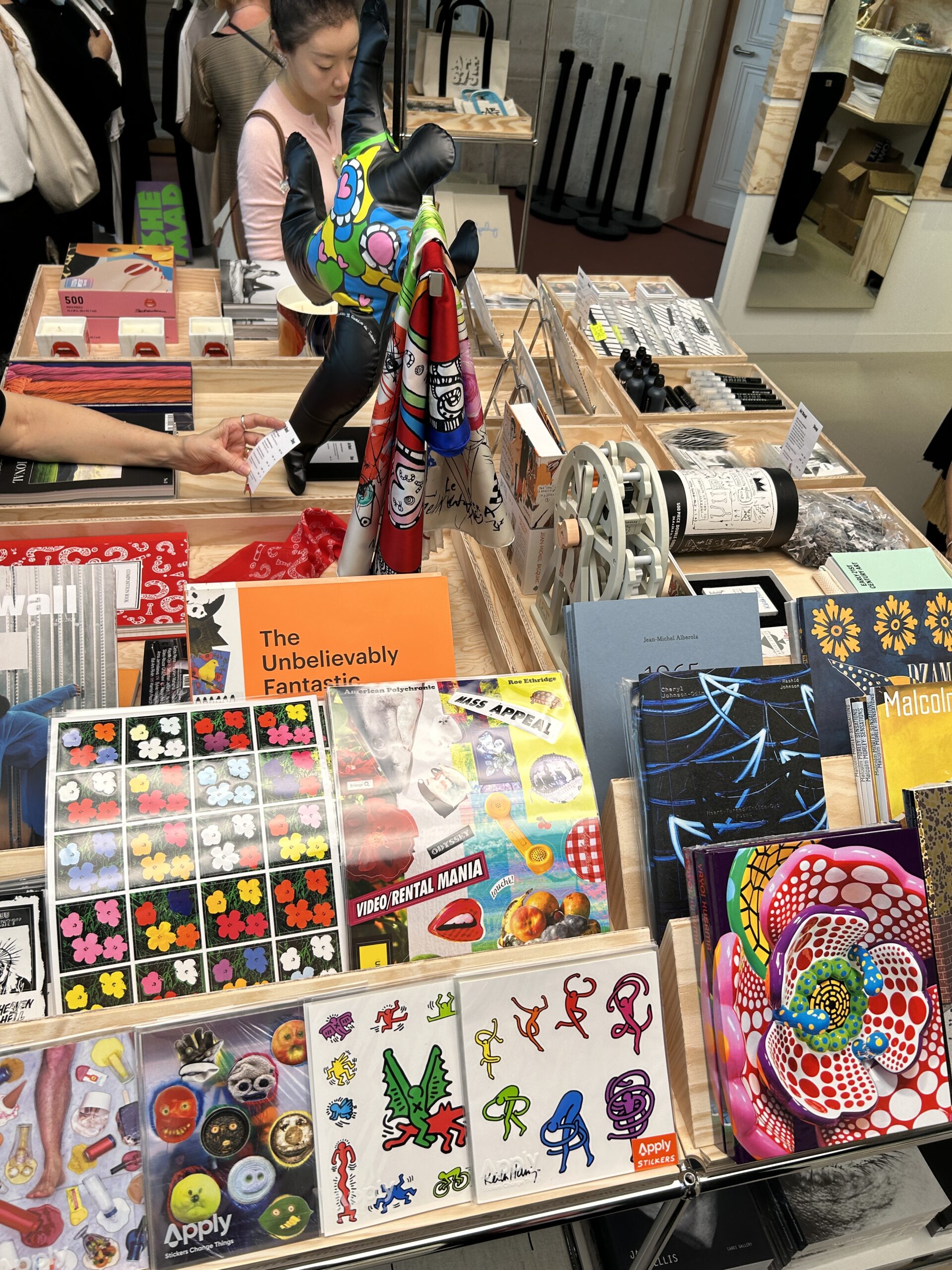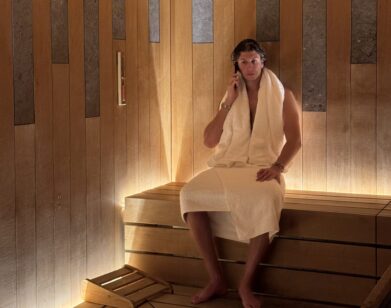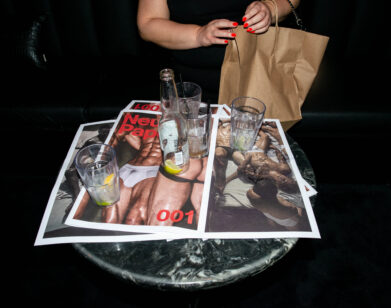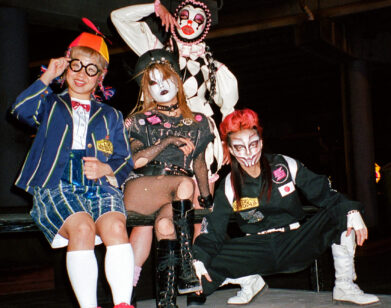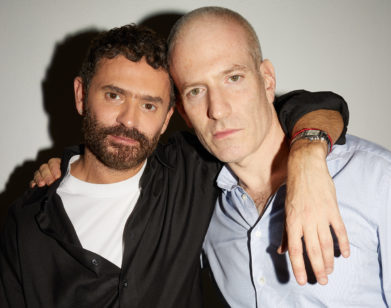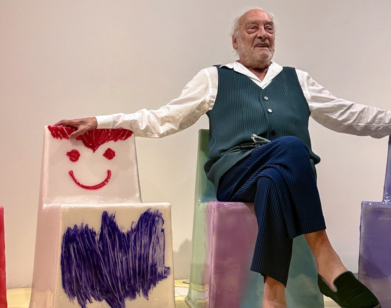FAIR
Colette’s Sarah Andelman Takes Us Inside Art Basel’s First-Ever Retail Shop
WEDNESDAY 4:50 PM OCTOBER 16, 2024 PARIS
Bathed in the glorious light of Paris’s Grand Palais, Sarah Andelman looks like a cross between a rockstar and a CEO. Last week, the founder of the iconic concept store Colette offered to give me a rare personal tour of the brand-new Art Basel Shop, a first-of-its-kind retail initiative she’s conceived and curated with the fair. But as Andelman tried showing me artist-made Rubik’s cubes and bracelets cut from the thinnest strips of paper, she could barely complete a sentence: collectors, fans, and artists interrupted at every turn to gush and pay their respects, and as she guided me toward a quiet corner of Art Basel Paris, she’d often pause mid-sentence to tweak a display or warn VIPs about drinking champagne inside the shop. It’s nothing short of mesmerizing to watch Andelman juggle it all. But amidst the chaos of the fair’s opening day, the celebrated French tastemaker took time to talk to me about her hazy youth, sleeping four hours a night, and the joys of collecting stupid objects.
———
SAMMY LOREN: Okay, let’s start. Where did you grow up?
SARAH ANDELMAN: I grew up right outside Paris, between Versailles and Saint-Germain en Laye in a little town called Louveciennes. It’s 30 minutes from Paris and my mom was working in Paris and we would go every Saturday to Rue Étienne Marcel to shops like Comme Des Garçons. By 18 years old I was interning at magazines like Purple, and I studied art history at the Ecole du Louvre. Then we opened Colette in ’97. I was 20 years old.
LOREN: And yet you grew up in this kind of small town. What was that vibe?
ANDELMAN: Oh my god. I cannot go through that. To be totally honest, I have zero memory of anything.
LOREN: You don’t remember it?
ANDELMAN: I moved to Paris when I was 15 years old. My parents separated. Before that, it’s nothing special. My mom had a wholesale fashion business. She was in a neighborhood called Le Sentier where she would sell to hundreds of shops. I would never have continued what she was doing, I was visiting galleries, museums very early, and I always loved little objects. I went to Japan when I was also 16 or 17 years old, so I always loved to collect stupid little stuff.
LOREN: What was the vibe at that time when you got to Paris? What were you into back then?
ANDELMAN: I remember going alone to the cinematheque, watching old movies by François Truffaut. I also had this connection with Purple Magazine early enough and was introduced to designers like Viktor&Rolf. And after, in 1997, we opened Colette, which we had started working on maybe nine months before.
LOREN: I read that you founded it with your mom.
ANDELMAN: Yeah.
LOREN: Was it hard to work with your mom?
ANDELMAN: No, we are very, very, very close, very complementary. We were lucky that I had been traveling in Japan, even going to London, [because] we would see products that we didn’t have in Paris. New York, you can’t imagine what it was before the internet, that some brands where you had to travel to bring back a shampoo or something cool.
LOREN: That’s something I want to ask you about since you brought up the pre-internet days. It’s interesting how at the shop here in Basel, it’s only stuff you can get now, right?
ANDELMAN: Yeah. That’s a choice. It’s a lot of work to put together this collection. And I think it’s cool to be able to say to the people here, “It’s only here.” But I am 200% for opening an eShop Art Basel shop at some point, and I hope they will one day. But it’s true that people who saw the bag we had, or the signed Jeff Koons skateboard—the first question on Instagram is, “Is it coming online?” No, it’s only here, for the five days of the fair. Hopefully we sell them here and now.
LOREN: It’s interesting, because it ties into some other stuff I know you’re into like books and publishing. Tell me how you got into that.
ANDELMAN: With Colette, I was in charge of buying the books. Back in the day, I would go to the Frankfurt Book Fair, and of course I would meet with all the distributors of the publishers. I took lots of pleasure in doing that. Then we decided to stop Colette in 2017 and immediately after, brands contacted me to do collaborations, curation, special projects.
LOREN: Colette was such an iconic shop. Why did you decide to shut it down?
ANDELMAN: Well, [we ran it] for a little more than 20 years, and the situation changed a lot between these 20 years for retail. It was like we had to rethink everything or just close when it’s going well, when we are still on top. And thank god [we did], because after we closed in Paris there was the Yellow Vest [protests] which shut down the streets during COVID. I don’t know how we would’ve survived during COVID. So it was a perfect moment. It was a personal decision from my mom who wanted to retire to take care of my son. And me, I would not do it without her. So yeah, we were very happy. We went to Monsieur Pinault to say, “It’ll be a great space for Yves Saint Laurent and you could also hire our team we had at Colette.” So then I thought, “Okay, let’s start this small publication company called Just An Idea books, which allows me to give a platform to some artists I like,” some of whom had never had a book published.
LOREN: And what’s your vision for the book publishing company?
ANDELMAN: I think it’s something which stays. In this world, where everything is so futile, I like the object, I like the decisions you make when publishing books: which font, which cover, et cetera. I wanted to keep it simple as a collection. There are some books I love, like this bird series. There are books from Japan. My vision when I publish Sho Shibuya is that they will do well without me, or Lisa Cooper, this florist from Australia with those amazing bouquets. She’s super successful on Instagram, but I think having a book for her is something different. I like to introduce creative talents.
LOREN: How much sleep do you get at night?
ANDELMAN: Sometimes three hours, sometimes five hours.
LOREN: What’s a good night for you?
ANDELMAN: Seven hours.
LOREN: But what’s a normal night?
ANDELMAN: Four or five.
LOREN: Damn, dude.
ANDELMAN: But I’m not happy about that. With Art Basel, I’m not as organized. I’m alone in my company. With Basel, I have to follow the merchandising, the pricing. I have those feelings that I always have to do it myself.
LOREN: What do you mean?
ANDELMAN: That I work a lot, but sometimes it’s stupid. I’m doing a lot of stupid stuff.
LOREN: You’re not good at—
ANDELMAN: Delegating.
LOREN: Do you think that’s because you’re kind of a perfectionist?
ANDELMAN: I imagine so.
LOREN: Let’s talk about the shop a little bit more. You showed me around it a little bit. It’s super cool. This year, you worked with the conceptual artist Claire Fontaine. Why did you like them?
ANDELMAN: This is a decision we make with each fair director. So for Paris, it’s Clement Delipine. He sent me a short list of artists that I went through and decided which one would make sense on the product. Because there are some artists I love, but I don’t imagine their work on the product. And in the case of Claire Fontaine, it’s perfect. Iit was an organic decision with Clement Delipine, with the fair. And after, we have to ask the artist, “Do you want to do this?” We don’t want to do the same products with each artist. We will adapt really bespoke products for the city and for the artist’s style.
LOREN: Tell us a little bit about the pieces you did with them.
ANDELMAN: With Claire Fontaine, it’s a big artwork they did [called] Foreigners Everywhere in all the languages in neon. It became the title for the Venice Biennale. But then I proposed, “Do you want to do a pencil? Do you want to do an eraser? Do you want to do the Claire Fontaine notebook?” We did some posters, which is an easy product, and postcards with the paintings they splashed.
LOREN: Those were cool. Basel never even had a shop before this, right?
ANDELMAN: No, but that’s a fun challenge. The easy thing is that you want products related to art. Even if I do make some exceptions, like this paper bracelet for example, it’s a new brand that I know I would’ve carried at Colette. I find it so special to do jewelry in paper and not gold and silver. So I’m happy to have this platform to sell this kind of new conceptual brand. I want people to be a little surprised when they arrive and see not just another Murakami flower product. Which I love, but it’s everywhere. I try to not make it too easy. It’s a fun exercise and I think Art Basel will learn [from it]. It’s the second one, so Miami will be even better.
LOREN: Smoother, you mean?
ANDELMAN: No, I mean in the selection, in the merchandising, we can always do better. There’s the books, but we don’t have the right way to show them. So we’ll work towards this direction and do more partnerships with big brands, too. Now we have this perfume with Guerlain, but I think we can have tons of partners, like Miu Miu. But what they gave me, which not everybody would understand, is flexibility and freedom. For example, I don’t know if you heard We Are Ona is doing a big restaurant pop-up with Carsten Höller. When I learned that, I said, “Okay, let’s do an apron, let’s get the light he did for the restaurant.” And that was only two days ago. So for me, it’s important to have this kind of last-minute spontaneity.
LOREN: To conclude, is there anything you want to tell me about your work, about what you’re up to next?
ANDELMAN: I look forward to Miami. We will have events every day. We have book signing with JR tomorrow. And I have a big project in Hong Kong for Christmas.
LOREN: What are you excited about after the fair?
ANDELMAN: Halloween in Woodstock.


